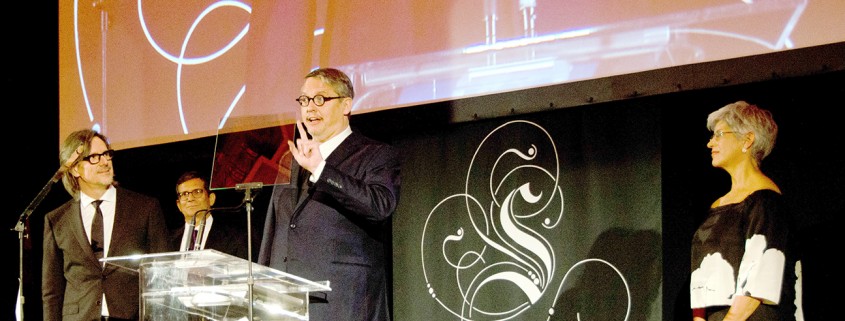USC Libraries gives awards to screenplays
Show Me a Hero and The Big Short both took home awards at the 28th Annual Scripter Awards, where USC honored the best film and television episode adaptations of novels. The event was held at Doheny Memorial Library Saturday evening.
This was the first year that the Scripter Awards included a separate award category for television episodes along with the feature films. Nearly 80 shows were considered by the selection committee, almost as many feature films were considered.
“We look for great writing, and an adaptation that is both innovative and faithful,” said Howard A. Rodman, chair of the Scripter Selection Committee. “We all felt that so much great writing was being done in television that it would be wrong for us to overlook it.”
The first-ever Scripter Award for the best adapted television episode was won this year by Lisa Belkin, William Zorzi and David Simon, novelist and screenwriter for the HBO miniseries Show Me a Hero. Zorzi traced the process of taking Belkin’s novel and making it a screenplay while Belkin expressed her satisfaction with the way the television episode reflected her novel.
“[British novelist] John Le Carré supposedly said that watching your book become a film is like watching your oxen be turned into beef jerky,” Belkin said during her speech. “But it was not like that at all. And it was because the people behind the adaptation were respectful and loving of both the written word and its history.”
The other nominees were screenwriters David Benioff and D. B. Weiss, for the episode “Hardhome” from Game of Thrones, adapted from the fantasy series by George R. R. Martin; Damon Lindelof and Jacqueline Hoyt for the episode “Axis Mundi” from The Leftovers, based on the novel by Tom Perrotta; Frank Spotnitz for the episode “The New World” from The Man in the High Castle, based on the novel by Philip K. Dick; Michelle Ashford, for the episode “Full Ten Count” from Masters of Sex, based on the novel by Thomas Maier.
Tara Shivkumar, a sophomore majoring in writing for screen and television, believed that adding a new category for the Scripter Awards reflected the increasing value of television as a medium for storytelling.
“I think it’s really important that they include television because it’s started doing the things that film is afraid of doing,” Shivkumar said. “Television has so much more diversity than film; it pushes boundaries in the way film doesn’t. Film tells the same stories over and over … But television is branching out from that and making these really complex characters that you can just follow.”
The Scripter Award for best adapted screenplay was presented after television episodes, with Adam McKay and Charles Randolph, screenwriters for The Big Short, taking the award.
For Randolph, the inspiration for The Big Short screenplay came from a frustration with the function of money in American society during the 2008 housing bubble.
“I was pretty unhappy with not just how our economy took a hit, but also the fact that there seemed to be no repercussions for anyone,” Randolph said. “Some of the worst actors walked away with the most to gain from it … Also it was a challenge: There’s something fascinating about taking on a really abstract idea.”
During the acceptance speech, McKay talked briefly about the importance of writing when it came to screenplays and entertainment, thanking Michael Lewis for writing a novel that he “bought at 9 p.m. and didn’t put down until 6:30 in the morning.” McKay also mentioned the library as an essential place to slow people down from everyday life and help them think. Randolph continued with McKay’s sentiment, drawing on his own personal experiences at USC.
“I wrote my first script in [Doheny],” Randolph said during his acceptance speech. “In this space that filled me with the sense of the importance of order [and] the importance of ideas, which are both invaluable.”
The other nominees for the award were screenwriter Nick Hornby for Brooklyn, based on the novel by Colm Tóibín, screenwriter Donald Margulies for The End of the Tour, adapted from David Lipsky’s memoir Although of Course You End Up Becoming Yourself: A Road Trip with David Foster Wallace; novelist Andy Weir and screenwriter Drew Goddard for The Martian and Emma Donoghue for the novel and screenplay of Room.
The selection committee is made up of 50 people, including Hollywood writers, producers, certain members and associates of USC Libraries, film critics and former winners, including last year’s Scripter Awards winner Graham Moore, screenwriter for The Imitation Game. The committee compiles a list of five eligible films and television episodes and then selects the winners through a second round of voting.
For Rodman, a good adaptation is both innovative and faithful to the original piece.
“Books are the single best medium that I know for getting inside people’s heads, an act forbidden to screenwriters who can only rely on what can be seen and what can be heard,” Rodman said. “A great adaptation elevates more than it betrays, sharpens more than it forces, brings more than it leaves behind … It brings the book to a new audience.”

